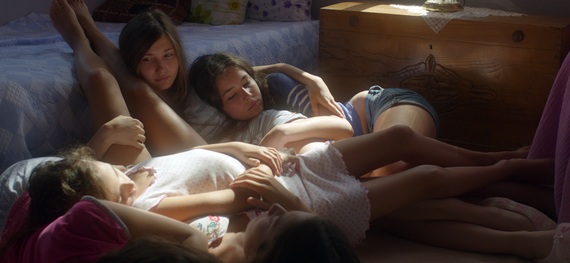The last person I would ever think about over a sunny holiday weekend is Donald Trump. Especially after watching a movie about a group of orphans in a land far, far away.
When Mustang opened to a small handful of U.S. theaters last year, it received gushing praise from critics everywhere. Typically, like many independent films, it evaporated at cinemas like an ice cube on a hot stove. When it became available on demand last month, I was ecstatic. I planned an evening to watch it with my husband and teenaged daughter. From the opening credits, we became totally engrossed. We were charmed and repelled. We laughed and we cried. Our hearts broke. The good news is that Mustang has a happy ending, although it's bittersweet. Then a funny thing happened on our way out to get ice cream. An unexpected realization caught us all off guard: Mustang is soberly relevant to the 2016 presidential election.
Mustang takes place in a small village in Northern Turkey. At its center are five beautiful and spirited sisters. The film opens on the last day of school before summer break. Lale, the youngest, is tearfully saying goodbye to her female teacher, who is moving to Istanbul. As the girls leave the school grounds, they decide to ditch the hot, crowded bus and walk home. On the way, they frolic and gallop, like a group of wild mustangs, with their long, dark hair, blowing in the warm wind. A detour to the beach with a group of boys soon has them in the sparkling, azure water, soaking their school uniforms and their hair, as they chicken fight atop the boys' shoulders. Their gleeful fun has extreme consequences when a nosey neighbor in a "shit-colored" dress (Lale's description), rats the girls out to their strict Turkish grandmother before they arrive home. They walk in the door, still giddy with joy, but the mood in the house is anything but mirthful. The sisters are surprised by the reaction to their innocent behavior. Without any discussion or respect to their viewpoints, they are scolded, shamed and physically abused. Meaningful possessions, like makeup and music, and are locked away. They are stripped of phones and electronics to block them from the outside world. They are made to wear those ugly shit-colored dresses. Home becomes a "wife factory" where the sisters learn how to stuff dumplings, sew and do other chores reserved only for females. They are living in a virtual prison, complete with iron grates on the windows and locks on the doors.
It is determined that the girls will all be married off, to men they don't know, whether they want to get married or not. They are disrespected and have no choice. So the girls are forced to play hostess to strange men that come to over to "approve" them, while serving Turkish coffee they've resentfully spit into. In another scene, Lale, an enthusiastic soccer fan, begs her uncle if she can attend a match. It's out of the question, but that doesn't crush her spirit. Being the catalyst for much of the action in the film, Lale finds a way to escape to the stadium with her sisters. The scenes are delightful, from climbing through a tunnel to get off their property, to flagging down a ride and cheering in the stands with their long dark hair flowing like wild horses. The girls break loose on other occasions, but afterwards, the house is reinforced with even more iron and steel. As a final blow, the girls are not allowed to return to school (a waste of time anyway, since girls are only good as baby making machines and housekeepers). Their environment is closing in on them, but the strength of their bond and fiery spirit fortify us. Kinship is reflected in every glorious frame of the film and these sisters make confinement almost seem tolerable. One scene shows all five girls entangled on the floor as they play with each other's toes before falling asleep. The atmosphere is comforting and warm, despite the cold, dark place in which they've been trapped.

The Turkish sisters of "Mustang" have a bond that makes confinement almost seem tolerable. (Photo courtesy of Cohen Media Group)
Appallingly, the movie reflects how women are treated in some countries even now. (In fact, the film is based on an actual experience by the film's Turkish/French director, Deniz Gamze Erguven.) There's no equality for women -- no driving, no sex before marriage, severe punishment for not abiding by men's rules and no continuing education. And these are just the tip of the iceberg. Women are second-class citizens with no say. Women are degraded, humiliated and disrespected all the time. Sadly, their suffering is as routine as the setting sun.
Girls in progressive, democratic countries who see Mustang will be astonished to observe a culture that oppresses women in this day and age. Sadly, traces of this attitude aren't all that outrageous to some. Of course, a Donald Trump presidency would not turn America into a small village in Northern Turkey. It would set women way back, undermining much of the progress that has been made. Mustang is a must-see movie for anyone who is within spitting distance of voting for the Republican front-runner. This important film will break hearts. Most importantly, it can change minds.
